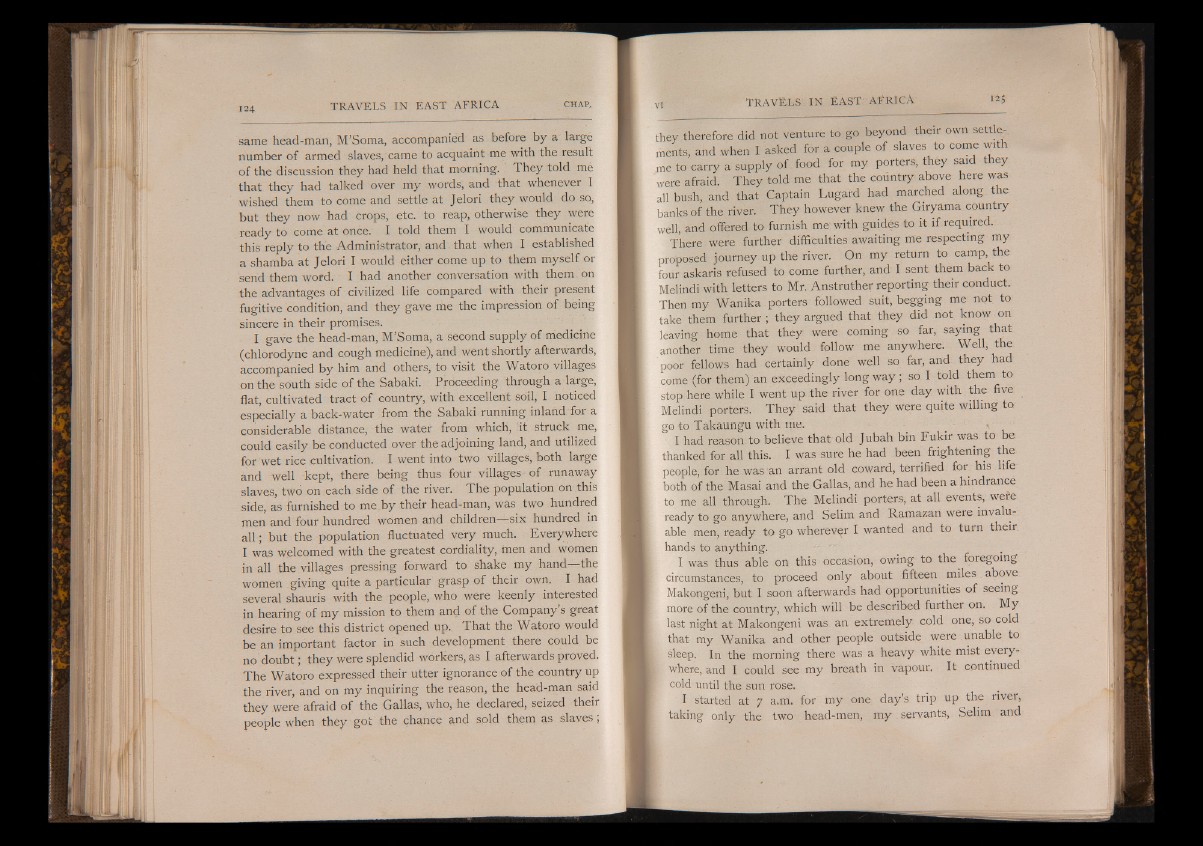
TRAVELS IN EAST AFRICA
same head-man, M’Soma, accompanied as before by a large
number of armed slaves, came to acquaint me with the result
of the discussion they had held that morning. They told me
that they had talked over my words, and that whenever I
wished them to come and settle at Jelori they would do so,
but they now had crops, etc. to reap, otherwise they were
ready to come at once. I told them I would communicate
this reply to the Administrator, and that when I established
a shamba at Jelori I would either come up to them myself or
send them word. I had another conversation with them on
the advantages of civilized life compared with their present
fugitive condition, and they gave me the impression of being
sincere in their promises.
I gave the head-man, M’Soma, a second supply of medicine
(chlorodyne and cough medicine), and went shortly afterwards,
accompanied by him and others, to visit the Watoro villages
on the south side of the Sabaki. Proceeding through a large,
flat, cultivated tract of country, with excellent soil, I noticed
especially a back-water from the Sabaki running inland for a
considerable distance, the water from which, it struck me,
could easily be conducted over the adjoining land, and utilized
for wet rice cultivation. I went into two villages, both large
and well kept, there being thus four villages^ of runaway
slaves, two on each side of the river. The population on this
side, as furnished to me by their head-man, was two hundred
men and four hundred women and children— six hundred in
a ll; but the population fluctuated very much. Everywhere
I was welcomed with the greatest cordiality, men and women
in all the villages pressing forward to shake my hand— the
women giving quite a particular grasp of their own. I had
several shauris with the people, who were keenly interested
in hearing of my mission to them and of the Company’s great
desire to see this district opened up. That the Watoro would
be an important factor in such development there could be
no'doubt; they were splendid workers, as I afterwards proved.
The Watoro expressed their utter ignorance of the country up
the river, and on my inquiring the reason, the head-man said
they were afraid of the Gallas, who, he declared, seized their
people when they got the chance and sold them as slaves;
they therefore did not venture to go beyond their own settle-,
ments, and when I asked for a couple of slaves to come with
me to carry a supply of food for my porters, they said they
were afraid. They told me that the country above here was
all bush, and that Captain Lugard had marched along the
banks of the river. They however knew the Giryama country
well, and offered to furnish me with guides to if if required.
There were further difficulties awaiting me respecting my
proposed journey up the river. On my return to camp, the
four askaris refused to come further, and I sent them back to
Melindi with letters to Mr. Anstruther reporting their conduct.
Then my Wanika porters followed suit, begging me not to
take them further ; they argued that they did not know on
leaving home that they were coming so far, saying that
another time they would follow me anywhere. Well, the
poor fellows had certainly done well so far, and they had
come (for them) an exceedingly long w a y ; so I told them to
stop here while I went up the river for one day with the five
Melindi porters. They said that they were quite willing to
go to Takaungu with me. - v
I had reason to believe that old Jubah bin Fukir was to be
thanked for all this. I was sure he had been frightening the
people, for he was an arrant old coward, terrified for his life
both of the Masai and the Gallas, and he had been a hindrance
to me all through. The Melindi porters, at all events, were
ready to go anywhere, and Selim and Ramazan were invaluable
men, ready to go wherever I wanted and to turn their
hands to anything. -
I was thus able on this occasion, owing to the^ foregoing
circumstances, to proceed only about fifteen miles above
Makongeni, but I soon afterwards had opportunities of seeing
more of the country, which will be described further on. My
last night at Makongeni was an extremely cold one, so cold
that my Wanika and other people outside were unable to
sleep. In the morning there was a heavy white mist every-
; where, and I could see my breath in vapour. It continued
i cold until the sun rose, '
I started at 7 a.m. for my one day’s trip up the river,
taking only the two head-men, m y . servants, Selim and